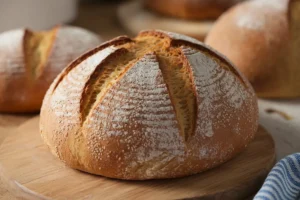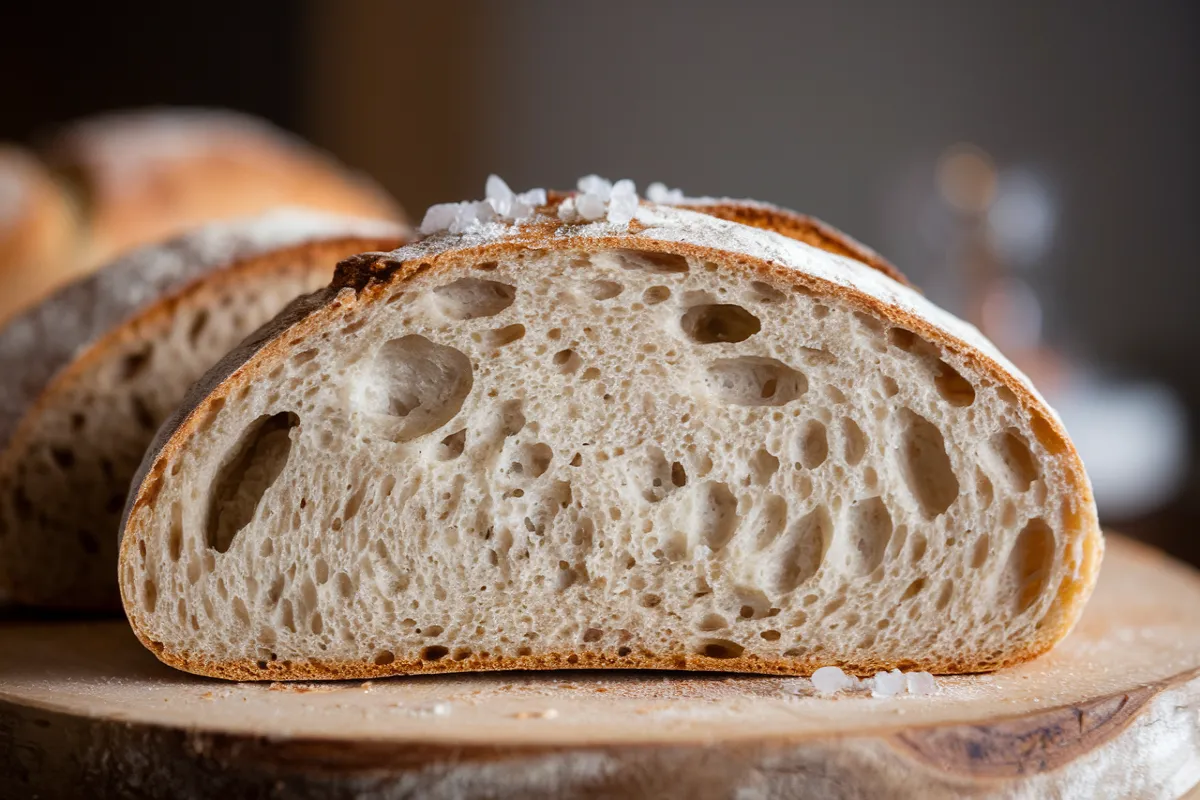Sourdough discard, often seen as a byproduct of the sourdough starter process, is now being recognized for its potential health benefits. While many bakers have been using sourdough discard in various recipes, its nutritional value and health advantages are gaining more attention. This article explores what sourdough discard is, its possible health benefits, and how you can easily add it to your diet.
What is Sourdough Discard?
Sourdough discard is the portion of sourdough starter removed during feeding. Maintaining a sourdough starter requires discarding a part of it to keep the balance of flour and water. Instead of throwing this portion away, many bakers use it in various dishes.
Although discard isn’t as active as the starter, it still contains beneficial bacteria and yeasts from the fermentation process. These microorganisms give sourdough its unique tangy flavor and may offer several health benefits.
Nutritional Composition of Sourdough Discard
Sourdough discard is more than just waste; it’s rich in nutrients and beneficial microorganisms. Here’s what sourdough discard typically contains:
- Carbohydrates: Being made from flour, sourdough discard is high in carbs, which provide energy.
- Proteins: The flour in sourdough discard supplies proteins, mainly gluten, which helps in forming the structure of baked goods.
- Fiber: Depending on the flour type, sourdough discard can be a good source of dietary fiber, which helps in digestion.
- Beneficial Bacteria and Yeasts: Fermentation encourages the growth of lactic acid bacteria and wild yeasts, both of which support gut health.
These components make sourdough discard a valuable addition to your diet, especially if you want to increase your intake of fermented foods. Fermented foods are known for their probiotic benefits, which are crucial for a healthy gut.
Health Benefits of Fermented Foods
Fermented foods have long been celebrated for their health benefits. According to the Harvard T.H. Chan School of Public Health, fermented foods can improve digestion, boost immune function, and help in weight management. These benefits come from probiotics—live microorganisms that benefit health when consumed in the right amounts.
Adding sourdough discard to your diet is an easy way to enjoy these benefits. The lactic acid bacteria in sourdough discard help maintain a healthy gut microbiome, which is vital for overall health.
Health Benefits of Sourdough Discard
Given its nutritional makeup, sourdough discard offers several potential health benefits:
1. Improved Gut Health
Probiotics in sourdough discard, mainly lactic acid bacteria, support a healthy gut microbiome. A balanced gut microbiome aids digestion, nutrient absorption, and immune function. Regularly consuming sourdough discard can help maintain a healthy gut, preventing issues like bloating and constipation.
2. Blood Sugar Control
Sourdough has a lower glycemic index, meaning it causes a slower rise in blood sugar levels compared to non-fermented dough. This can benefit those with insulin sensitivity or type 2 diabetes by helping to keep blood sugar levels stable. Healthline notes that the fermentation process in sourdough makes carbs more digestible, which can improve blood sugar control.
3. Enhanced Nutrient Absorption
Fermentation increases the bioavailability of nutrients. Sourdough discard can break down phytates in whole grains, compounds that block the absorption of minerals like iron, magnesium, and zinc. By reducing phytates, sourdough discard makes these minerals easier for your body to absorb, which helps prevent deficiencies.
4. Better Flavor and Digestibility
Sourdough discard adds a unique tangy flavor to recipes, making healthier whole-grain options more appealing. The fermentation process also pre-digests some of the starches and proteins, making the final product easier to digest. This can be particularly helpful for those with mild gluten sensitivity, as sourdough discard may be easier on the stomach than non-fermented wheat products.
How to Use Sourdough Discard

Sourdough discard is incredibly versatile in the kitchen. Here are some popular ways to use it:
- Pancakes and Waffles: Add sourdough discard to pancake and waffle batter for a tangy flavor and a probiotic boost. Even after cooking, some probiotics in the discard may survive, making these a healthy breakfast choice.
- Crackers: Use sourdough discard to make crispy, tangy crackers. These are great for snacking and can be paired with various toppings for a nutritious treat.
- Quick Breads: Incorporate sourdough discard into quick bread recipes like banana bread or zucchini bread. It adds moisture and depth of flavor, making these treats even more enjoyable.
- Pizza Dough: Sourdough discard in pizza dough gives your pizza a delicious, slightly tangy crust. It’s healthier and easier to digest than traditional pizza dough.
When using sourdough discard in recipes, adjust the liquid and flour content to maintain the right balance of ingredients. This ensures that your final product has the perfect texture and taste.
Risks and Considerations of Sourdough Discard
While sourdough discard offers many benefits, consider the following risks:
- Overconsumption: Moderation is key. Eating too much sourdough discard can lead to digestive problems, especially if you’re not used to a high-fiber diet. Start with small amounts and gradually increase your intake.
- Gluten Sensitivity: Sourdough discard contains gluten, making it unsuitable for those with celiac disease or severe gluten intolerance. However, the fermentation process reduces some gluten, which might make it more tolerable for those with mild sensitivities.
- Proper Storage: Store sourdough discard correctly to avoid spoilage. Keep it in a sealed container in the fridge and use it within a week. If you notice any mold, off smells, or color changes, discard it to avoid foodborne illness.
Sourdough Discard vs. Other Fermented Foods
How does sourdough discard compare to other fermented foods like kefir, yogurt, and kombucha?
- Kefir and Yogurt: These dairy-based foods are rich in probiotics and provide different nutrients, including calcium and protein. They’re also better suited for those needing gluten-free options.
- Kombucha: Kombucha, a fermented tea, offers probiotics but lacks the carbs and fiber found in sourdough discard. While both kombucha and sourdough discard benefit gut health, sourdough discard also supplies energy and nutrients from the flour.
Sourdough discard’s combination of probiotics and nutrients makes it unique among fermented foods. Its versatility in cooking also makes it an appealing option for those wanting to add more fermented foods to their diet.
Frequently Asked Questions About Sourdough Discard
Is sourdough discard safe to eat?
Yes, sourdough discard is safe to eat if stored correctly and not contaminated. Check that it doesn’t have any signs of spoilage, like unusual colors or odors.
How long does sourdough discard last?
Sourdough discard can last up to a week in the fridge. However, for the best flavor and safety, use it within a few days.
Can I use sourdough discard stored for a long time?
Yes, but older discard may taste more acidic. You can still use it, but you might need to adjust your recipe to balance the flavors.
What are signs of spoiled sourdough discard?
Spoiled sourdough discard may have mold, a bad smell, or unusual colors like pink or orange streaks. If you notice any of these, it’s best to discard it.
Is sourdough discard gluten-free?
No, sourdough discard contains gluten and isn’t suitable for a gluten-free diet. Those with celiac disease or severe gluten intolerance should avoid it.

Conclusion and Final Thoughts
Sourdough discard isn’t just a byproduct of sourdough baking; it’s a potential source of health benefits and culinary creativity. With its probiotic content and nutrient profile, sourdough discard can enhance a balanced diet. From pancakes to pizza dough, there are many ways to use sourdough discard in your meals, making it a versatile and nutritious ingredient.
However, it’s important to use sourdough discard in moderation and as part of a varied diet. This approach lets you enjoy its unique flavor and health benefits without any downsides.
Incorporating sourdough discard into your cooking not only reduces food waste but also adds a unique and healthful twist to your dishes. Whether you’re a seasoned baker or new to sourdough, experimenting with sourdough discard is a delicious and nutritious way to enhance your cooking.

